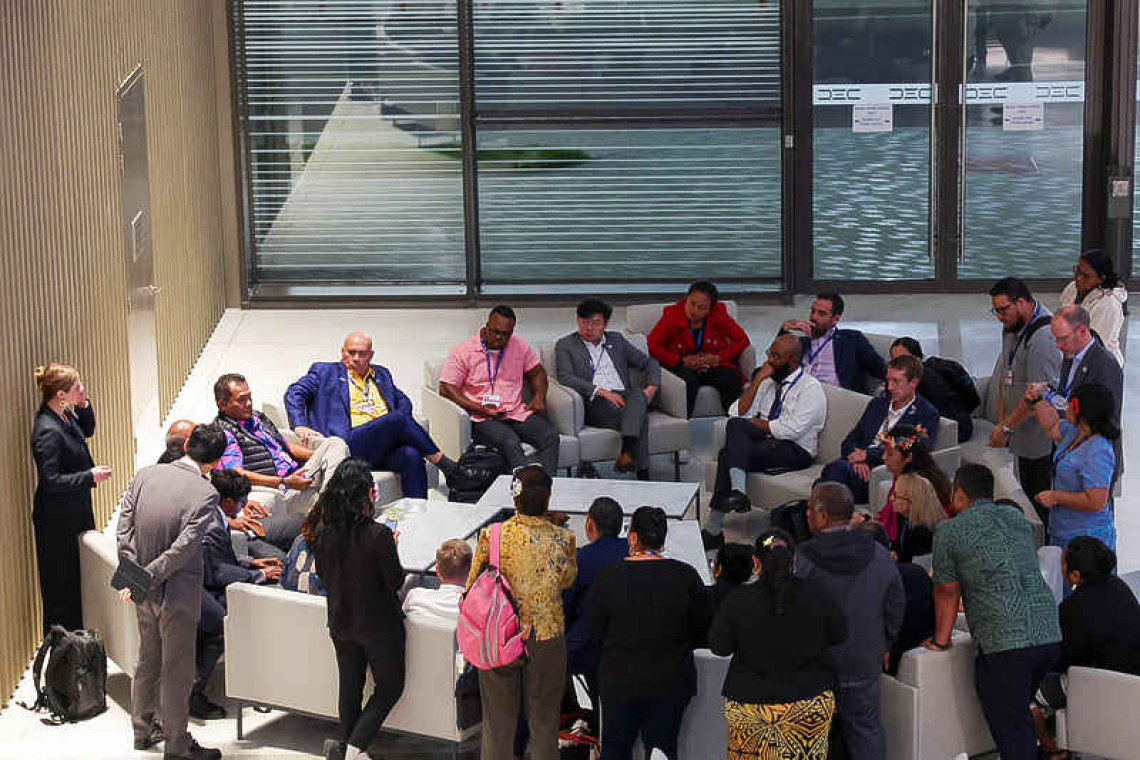DUBAI--When Brianna Fruean, a young Samoan climate activist, and her exhausted colleagues from Pacific Island states realised the COP28 climate summit would not deliver a hard-fought-for agreement on a fossil fuel phase-out, there were tears.
"We are not fighting for ourselves. We are crying for our people," said Fruean, reflecting the strong emotions of many citizens of low-lying island nations hit hard by rising seas and more damaging floods and storm as the planet warms. The 39-strong Alliance of Small Island States (AOSIS) won inclusion of the more ambitious 1.5 degrees Celsius warming limit in the 2015 Paris Agreement. Now many fear that goal has been sacrificed in a compromise deal at COP28 that calls for "transitioning away from fossil fuels in energy systems" to achieve net-zero emissions by 2050. The deal does not specifically seek an end to fossil fuel production and consumption - and leaves open loopholes and a lack of finance that could put that goal at risk, analysts warn. "1.5 cannot be negotiated for us," said Fruean, in a position echoed by AOSIS on Wednesday following the adoption of the final deal at COP28. Negotiations ran a day overtime as nearly 200 countries struggled to find common ground on a greener energy future. While recognising the COP28 agreement contains some "good elements", Anne Rasmussen, the lead negotiator for Samoa, said "we have come to the conclusion that the course correction that is needed (to meet the 1.5C goal) has not yet been secured." "We have made an incremental advancement over business-as-usual when what we really needed is an exponential step-change in our actions and support," she said, after the deal was quickly approved before the AOSIS team arrived in the hall. Speaking to media later, Tina Stege, climate envoy for the Marshall Islands, said COP28 had achieved "something historic" by calling for a move away from fossil fuels, which she called "the root cause" of the climate crisis. But the deal is only "the beginning of something that needs to evolve into something much bigger," said Stege, whose Pacific island nation is also part of AOSIS. "We need to go much further, much faster," she said. Johan Rockström, an earth system scientist and co-director of the Potsdam Institute for Climate Impact Research, said the COP28 deal would not enable the world to hold the 1.5C limit. But he described the agreement as "a pivotal land-mark" that makes it "clear to all financial institutions, businesses and societies that we are now finally - eight years behind the Paris schedule - at the true 'beginning of the end' of the fossil-fuel driven world economy." U.S. climate envoy John Kerry told reporters in Dubai that he believed the global economy would move to a low-carbon model, but he was still not sure whether it would happen in time to avoid the worst effects of climate change. Simon Stiell, executive director of the U.N. Climate Change secretariat, noted in his closing speech that current levels of action to tackle climate change put the planet on track for just under 3C (5.4 Fahrenheit) of warming this century. "This still equates to mass human suffering, which is why COP28 needed to move the needle further," he added. He urged all governments and businesses to turn the myriad pledges made at the two-week conference - from making food and health systems more resilient to climate change, to expanding solar power and protecting carbon-storing forests - "into real-economy outcomes, without delay." Eyes now turn to how the COP28 commitments to shift away from fossil fuels, triple renewable energy capacity and double the rate of energy efficiency improvements by 2030 will be incorporated into the next round of national climate action plans due by early 2025 - and how the outcome will influence financial markets. Teresa Anderson, global lead on climate justice at ActionAid, said the language in the deal on transitioning away from coal, oil and gas would send a clear message to financial institutions that "it makes no more sense to invest in fossil fuels which will soon be stranded assets." But, she added the COP28 agreement had not gone far enough in specifying that rich countries should act first in terms of cleaning up their energy mix, nor in putting new money on the table to help developing states invest in renewables and leave their fossil fuels in the ground. Next year's COP29 summit in Azerbaijan will focus on setting a goal for the levels of climate finance that will be needed from 2025 onwards to help poorer nations curb greenhouse gas emissions, adapt to worsening extreme weather and higher seas, and respond to unavoidable climate "loss and damage". Climate-vulnerable countries in Africa, Asia and Latin America came away from COP28 with some new pledges of funding from wealthy governments - including nearly $800 million for a new loss and damage fund launched at the start. The Green Climate Fund also was promised an additional $3.5 billion and the Adaptation Fund $188 million. Collins Nzovu, Zambia's green economy and environment minister, who represents the Africa group of countries, told Context that the "movement" on loss and damage was appreciated and he expected more money to start flowing as multilateral development banks free up more funding for climate action. There was also agreement in Dubai on how to put a global goal on adaptation into practice to build the resilience of water and food supplies, cities and natural ecosystems. But analysts said it lacked concrete targets and specifics on how to plug a growing gap in finance for adaptation.







